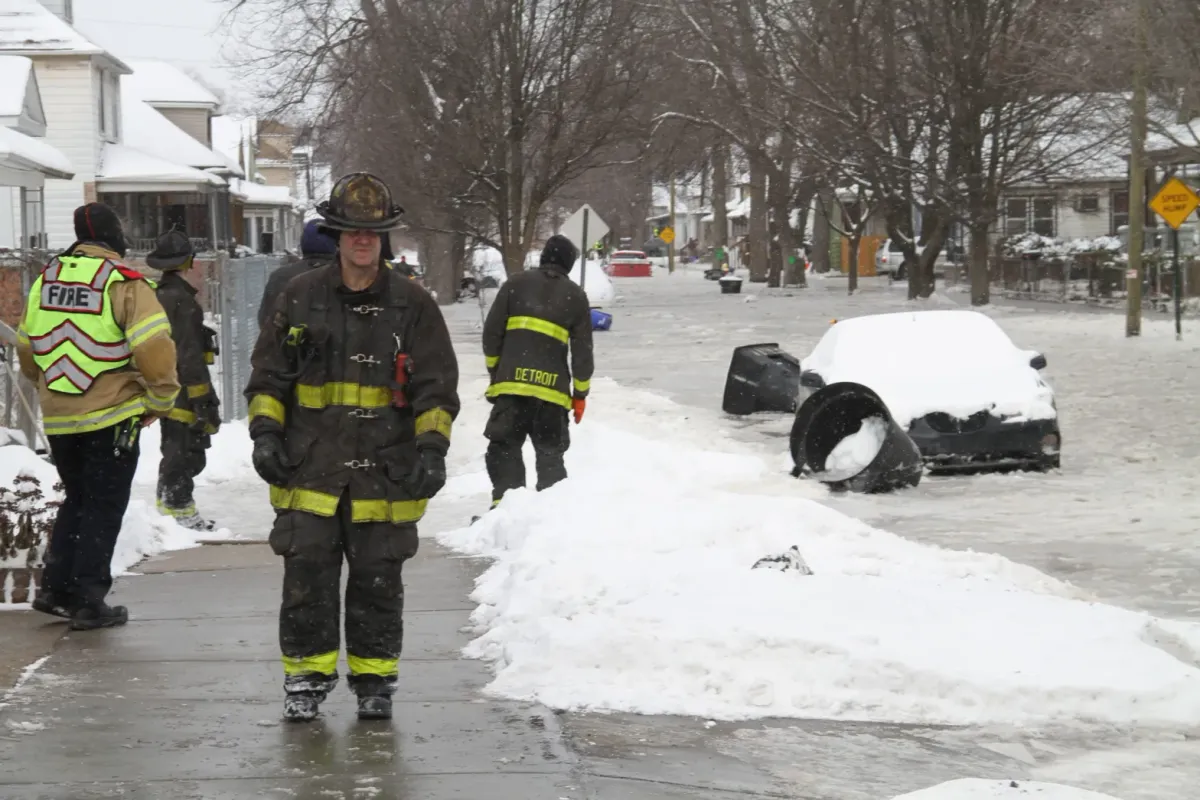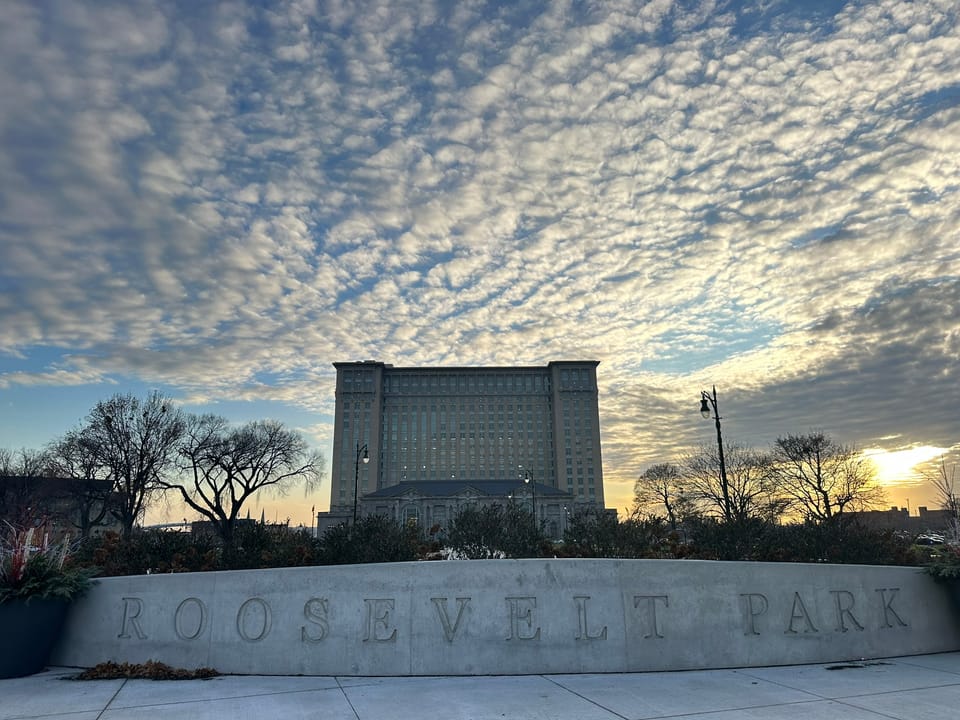This episode of Daily Detroit dives deep into the devastating flooding that impacted Southwest Detroit, with hundreds of homes affected.
Reporter Malachi Barrett from Bridge Detroit joins host Jer Staes to provide an on-the-ground perspective and critical insights into the disaster.
Below you'll find an automated, lightly edited transcript of the conversation, and you can listen to it here if you don't see the player above.
Speakers:
- Jer Staes (JS)
- Malachi Barrett (MB)
Transcription:
JS: Joining us at the table at TechTown is none other than reporter for Bridge Detroit. And I want to say, I really appreciate your work, Malachi Barrett. First time on the show, but I know this isn't the first time we've talked.
MB: Yeah, no, I think we met for the first time at Mackinac at the Policy Conference. And I've been a long-time listener. I love the show and what you do to bring exposure to stuff going on in the region. So, thanks for having me.
JS: Well, I got to say with our topic today, have you dried off yet?
MB: My feet are still a little soaked from icy flood waters in Southwest Detroit. Um, but other than that, I'm pretty warm. I'm doing okay.
JS: That's good to hear. And about that, because wow, woke up on Monday morning and just started to see all kinds of uh, of reports of what's going on. You've been doing some great work on the ground for Bridge Detroit. So, let's get started with the basics. What what happened out there that flooded blocks of Southwest Detroit?
MB: Yeah, this was an all hands on deck uh, response from us this morning. I mean, I woke up and got a news alert from Fox 2 saying that there had been flooding in Southwest. I didn't realize the extent of it until I clicked on the story and saw the photos, water up to 5 feet, you know, flooding basements up to the first floor in a lot of circumstances. So, we decided to go out there and see what was going on. Uh, and we learned today that basically a water main, a water transmission line, uh, operated by GLWA, the Great Lakes Water Authority. Uh, in Southwest Detroit, uh, just east really of El Asador Steakhouse over there, good spot. Broke around 2:00 in the morning. Residents reported hearing like a really loud bang at like 2:00 a.m. Um, and immediately city officials were scrambling to kind of identify what had gone wrong, how much water was coming out, what needed to happen. And basically over the course of about 5 hours, the city and the water department working with GLWA were able to isolate the spot on the line that was broken, turn the water off, start to get some pumps in there and hopefully get the water to recede. In the meantime, I mean, we couldn't even quantify it. I asked the GLWA director today how much water actually was flowing from the system for those 5 hours and she said a lot, but didn't have a number. Uh, you know, I would estimate you know, thousands of gallons of water probably. I mean, it really, it was comparable to the 2021 floods that people probably recall. Uh, in that, you know, there were cars floating in the street. It was complicated a little bit by the fact that it was like 19 degrees this morning and so all of that flood water there was a layer of ice on top of it. But really what we witnessed was an all hands on deck from the emergency response angle to evacuate people from those homes, get them set up in shelter. And so that's kind of what we're going to be watching moving forward.
JS: The visuals were stunning. In our member Discord, people were sharing Instagram reels and TikToks and things of water, not just in the street, not just on the sidewalks, but right up to people's yards. Visually, when you were on the ground there, how did it feel for you to see all that?
MB: It was disastrous. I mean, it it reminded me very much of that '21 flood, which was a federal emergency. It affected a wider area of the city than this, but it was a very similar, you know, look on the ground. People, there was one homeowner who told me he woke up this morning to water rushing into his house from the side door through his backyard, basically burst into his house like a dam breaking and he described it as, you know, a river of water flushing through nothing could really stop that. Um, you know, people are somewhat familiar, I think, with basement back-ups and floods happening from the sewage system. This is a little bit different, because it was a water main break, the water was coming in from outside. And you know, thankfully it was not sewage water, so the clean-up will be a little bit easier there. But you had some I mean, I was talking to one gentleman who was standing at the end of the street and about two blocks up, his dog was sitting on the porch, probably a little confused, barking a little bit about, you know, with some of the first responders going by, but he had no way to go back and and rescue his dog. People, obviously, were stranded as well. There were inflatable boats from I think Shelby Township. The emergency response was, you know, far and wide across the kind of three county area over here. Dugan said today, there were some folks who drove about an hour down to to offer some support. But they had inflatable boats that they were dragging people through the water. You know, families with kids, seniors who are mobility limited and had issues getting around that were trapped in their homes. There were more than 60 people that were evacuated that way this morning and a lot more that were brought out by neighbors. There were a number of people that had those rubber waders and big like duck hunting, you know, boots on, trudging through the water. But yeah, I mean it was it was up to a knee in some places, up to your waist in more. It's been receding throughout the day. I think if you were to go out there now, it probably would be, you know, more to your ankle or something. Um, but yeah, it's hard to even really put into words. I've never really seen anything like that before.
JS: I want to get into the response, but first, let's draw people a picture because Southwest Detroit's kind of big. Where exactly are we talking about? I know it's near I-75 and there's a rail line nearby.
MB: It's basically just north of the Fisher Freeway and kind of tucked between that and the railroad you mentioned. It was on Beard and Rowan, where it burst and it spread um, about four or five blocks west, about the same distance east. Unclear how many homes are actually affected. The city did not have a number for that today, but there were some folks who were putting together like UPS data to track how many homes. It might have been around 450 houses actually in the impact area drawn by GLWA.
JS: That's huge. 450 homes, that's huge and that's a lot of people.
MB: Yeah, absolutely. I mean, you imagine every one of those homes has, you know, two to three people in it and we heard from a lot of like intergenerational families is very common, you know, in Detroit where you've got grandparents, their kids and their kids' kids all kind of staying in one situation. So, a lot of neighbors trying to figure out what they could do to help their neighbors today, a lot of community response in addition to like the emergency responders there too trying to go knock on doors and get people out.
JS: So, this is not a federal emergency. This is a more local emergency. How is this response being handled between GLWA and then I assume the Detroit Water and Sewage Department. How's that splitting up?
MB: Yeah, it's an interesting situation because with the changes to our water system that happened as a result of bankruptcy, you have kind of this dual government response here. What's interesting about this, uh, is the mayor today said that residents who are affected will have costs covered, basically, uh, for damages and to replace water heaters, boilers, all those utilities that were damaged by the flooding. GLWA and the city will split that cost 50/50. It's unclear how that program will work moving forward. The city put up a hotline. And we don't know what kind of limits there might be or the details or shape of that reimbursement program. But that is a good sign for folks that the city is committed to reimbursing them for the cost of any uninsured damage. There were some people I talked to that had flood insurance, but they weren't sure how that would apply here because it wasn't a natural disaster. The mayor said another silver lining of this is you don't have to get FEMA involved. The federal process of applying for FEMA aid was very slow. There's some people even from those '21 floods that we mentioned that are still trying to get help through the feds. So, this is a much more streamlined process. The city has set up just one individual hotline that's the one-stop shop for everybody calling in for support, and that's 313-774-5261. And that's where people can go to get set up in hotels temporarily until heated water is turned back on. The city is going to cover the cost of hotel stays for people as well as pay for some food. And they can get on that list to have a city inspector eventually come out and assess the the damage.
JS: Does this raise any questions about aging infrastructure? Because this pipe has been in the ground, I was reading some reports, I want to say what, the 1930s?
MB: That's what GLWA said. Yeah, they didn't give a specific date, but
JS: that's 90 or 100 years of infrastructure underground there. And although steel and I've seen being in Detroit for a while. I've seen some crazy infrastructure that's been dug up over the years. Yes, it's a steel pipe, but also you have to wonder like what is the useful life of these things? Are there other surprises, not just in Detroit, but across the region with these kind of things?
MB: Yeah, definitely. And I mean, I don't really know what the strategy is to replace water mains like this. The city's doing a lot to replace lead lines right now. Um, and has a lot more to do there. But I think that's where a lot of the reporting will go in the next week or so is identifying how did this happen? Because there's really not a good answer for that yet, besides the kind of shrinking and growing that the ground goes through in the winter with the temperature fluctuations, you know? I mean, that's a common cause of water main breaks that happen fairly regularly, not anything to this extent obviously, but water mains, you know, you get a couple every few months in the winter. But yeah, what is the solution here? I mean, does everyone who lives on a block where there's a pipe of this age, do they have reason to worry in the winter? We don't really have a good sense of that right now.
JS: Housing's another concern for the people who are immediately affected by this. There's some plans from the city and from GLWA for that, right?
MB: Yeah, they're putting people up in a Sonesta extended stay hotel. Anyone can call that hotline that I gave and they will uh pay for your room and they'll pay for food as well and that's supposed to be until you can safely move back into your house, which means you have your electricity and heating.
JS: I imagine though, still the remediation is going to take a while. No, it's not sewage water, but I can't ... This much water into a basement in some cases, if something's coming through somebody's side door, that's getting up to your like main floor and things like that. I mean some of these homes are going to be brick and stone and different different things, but you're going to have stuff in the basement, you're going to have drywall, you're going to have just so many different complications that are possible with this. Plus the freezing because it is so darn cold out there right now.
MB: Right, and just like how long will it take for the inspections to happen on their own? You have to have someone come out and look at the damage and give you a number for what they think is fair and maybe you'll dispute that. There's a lot of unanswered questions and you know, it can come with a process like this and people have gone through this before with basement backup protection, uh, you know, the FEMA help in the '21 floods and uh, you know, it can be kind of a difficult process. The mayor has said that they're going to try to streamline this and make it as simple as possible for folks. But I that was a question they weren't able to answer today. I asked them how long do you think it will be until people can move back in their houses? They don't really know at this point.
JS: Bridge Detroit does such a great job of adding context to your stories and kind of staying with things long term. What are some of the things that you're thinking about now for coverage in the next coming weeks and months?
MB: Yeah, I mean, on kind of another end, you mentioned the the kind of housing support network that needs to rise up uh for these people that have been displaced. I think this is going to be potentially another test of our housing shelter, our our homeless assistance network, you know, a week after we saw a pretty catastrophic failure of that with the death of the two children in the casino parking garage. So I think it continues to reiterate some of these challenges that Detroiters are facing on a daily basis between the aging infrastructure, between the lack of resources, between the the threats to housing stability. I don't think that this was on their bingo card for flooding, but flooding certainly has displaced people before. So, I think for me, it's how resilient is the city, you know, in these situations. Certainly the response uh was quick. City officials were were patting themselves on the back for putting together a complicated response to this today, but how did we get here? And and what do we do to prevent something like this from happening in the future? And of course, this is happening in a mayoral election year and so we've been asking uh candidates who want to replace Mike Dugan, what they would do uh to to fix some of these situations. And it kind of makes you think like this is a tough job being the mayor. Do these people that are lining up, do they realize they might be woken up by a phone call at 2:00 a.m. of a neighborhood underwater? You know, it's uh ... I think it adds a lot more kind of urgency around some of these conversations we're having about who's leading the city.
JS: Not just with the city, but Dugan is a candidate for governor. True. So the state is also watching how he's responding to this because a state as large as ours, these kind of things can happen anywhere, whether it's a water main break or some other kind of tragedy, you're dealing with stuff from here to Lansing to Marquette to Crystal Falls.
MB: Imagine Whitmer's whole first term was a dam breaking that devastated ... you know.
JS: I try to put that out of my mind.
MB: In Benton Harbor with a lead water crisis, let alone the pandemic and probably two things I've forgotten on top of that. So yeah, definitely.
JS: Malachi Barrett, I really appreciate you. Where can people follow you and learn more and keep up with everything?
MB: Yeah, find us at bridgedetroit.com. We are a nonprofit newsroom here serving the city and we can't do that without the support and feedback from people. We need to hear from you directly. What information do you not have that you need? What are the things that you want us to be looking into? You can also subscribe to our newsletters for free. I do a weekly city council notebook that really is like everything you need to know about what the city council is doing as well as bits of political intrigue throughout this year. It's also free. So yeah, find us online, subscribe to our newsletters, find me on Twitter. I'm @polarbarrett, but
JS: That's one, great handle.
MB: Thank you.
JS: But also two, part of the excellent media row that's really happening up here in Detroit now, you know, back in the day it was Lafayette Avenue, but now you guys are down the street, uh here at Tech Town, you got the Detroit News. There's just so much happening up here. It's really cool to see.
MB: Yeah, I love it. We're like three blocks away, so you reached out today and I could pop right over and um, you know, I love what Outlier is doing here in the building too.
JS: Oh yeah, shout out to them. Yeah, Orlando's great. He's been on the show.
MB: Right, and former Bridge Detroit leader as well. So yeah, we're all working together on the same mission, but I'm glad that we can kind of do it in our own flavors.
JS: Local media isn't possible without local support. So thanks to Angela who joined us and Jeffrey that upped their support at patreon.com/dailydetroit. The social media apps, the podcast apps, they do not pay us. And no, there's no large corporation behind what we do. Our independent work is supported by you, our listeners and local sponsors. So get swag, get access to our private Discord community chat and more patreon.com/dailydetroit. Until tomorrow, I'm Jer Staes. Remember that you are somebody, and I'll see you around Detroit.
7 Key Parts with Timestamps:
- Introduction to Flooding: [00:00:05] - JS introduces the topic: severe flooding in Southwest Detroit.
- Description of Devastation: [00:02:40] - MB vividly describes the extent of the flooding, including flooded homes and cars floating in the streets, comparing it to the 2021 floods.
- Emergency Response Efforts: [00:03:29] - MB details emergency response, including evacuations via inflatable boats, and assistance to families with children and seniors.
- Cause of the Flooding: [00:05:07] - MB specifies the cause was a broken water transmission line operated by GLEWA.
- City's Response and Aid: [00:07:14] - MB reports on the city's plan for reimbursement for uninsured damage.
- Questions about Infrastructure: [00:08:23] - JS questions about the age of infrastructure, leading to a discussion about the need for infrastructure replacement and community concerns.
- Looking Forward: [00:12:17] - JS and MB discuss longer term questions, like housing support, resilience, and implications for the mayoral election.




















